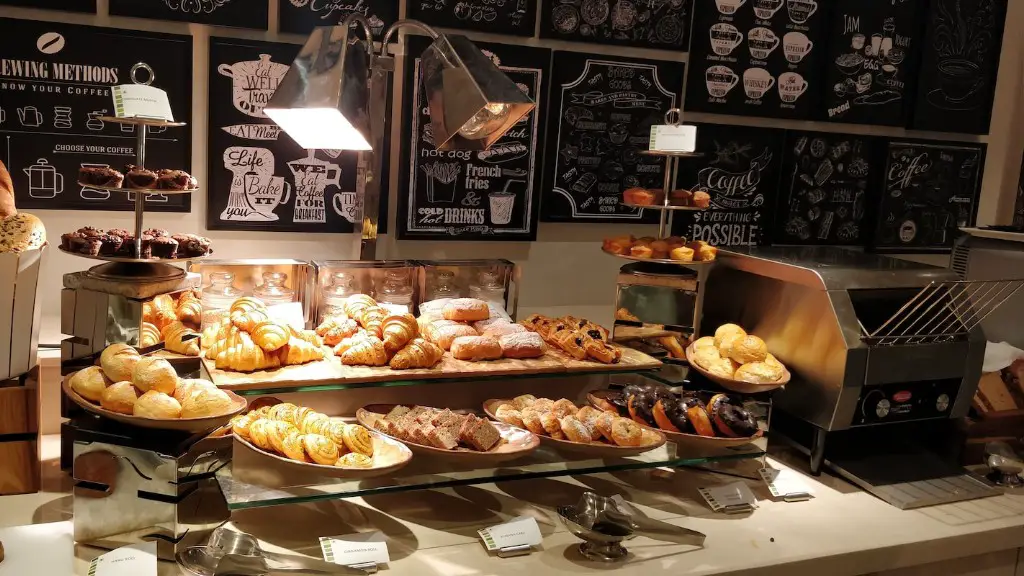In order to open a coffee shop, it is important to have a business plan. This document will outline the steps needed to open a successful coffee shop. The business plan should include a description of the business, the products and services offered, the target market, the competition, the business location, the start-up costs and financing, and the company’s management structure.
Writing a coffee shop business plan is not as difficult as it may first appear. There are a few key elements that need to be included in order to make your business successful.
1. The first step is to do your research. This means you need to find out everything you can about the coffee shop industry. This includes studying your local area and what type of coffee shops are popular, as well as looking at the competition.
2. Next, you need to write out your goals and objectives. What do you want your coffee shop to achieve? How will you make it successful?
3. Once you have your goals in place, you need to start working on your marketing strategy. This is how you will get customers in the door and keep them coming back.
4. Finally, you need to put together your financials. This includes your start-up costs, your forecasted revenue, and your expenses.
A coffee shop business plan is a vital tool for any new business. By taking the time to properly research and write your plan, you increase your chances of success.
How do I write a coffee business plan?
1. Executive Summary:
The executive summary should provide a brief overview of your coffee shop business plan, including your company’s mission and objectives, as well as a summary of your key market analysis and financial projections.
2. Company Summary:
This section of your coffee shop business plan should provide more detailed information about your company, including your company history (if applicable), your company structure, and your key personnel.
3. Management Team Overview:
In this section of your coffee shop business plan, you should provide an overview of your management team, including their experience and qualifications.
4. Product and Customer Targeting Strategy:
Your coffee shop business plan should include a detailed strategy for targeting your desired customers and products. This section should include information on your store design, equipment choices, and user experience.
5. Proposed Location and Market Analysis:
This section of your coffee shop business plan should provide a detailed analysis of your proposed location, including a market analysis of your target market.
6. Financial Plan:
Your coffee shop business plan should include a financial plan, detailing your projected revenues and expenses. This section should also include information on your funding requirements and your financial projections
Creating a business plan for your cafe can seem like a daunting task, but it is an important step to take before starting your business. A well-thought-out business plan will show others (and yourself) that your cafe can be successful. There are a few key things to keep in mind when creating your cafe business plan:
1. Your business plan should be clear and concise.
2. It should include an executive summary, market analysis, business model, financial projections, and more.
3. Be sure to do your research and understand the cafe industry before writing your business plan.
4. Your business plan should be realistic and achievable.
5. Remember to revise and update your business plan as your cafe business grows.
How do I write a business plan for a small shop
A traditional business plan is a document that businesses use to outline their goals and strategies for achieving those goals. The plan typically includes nine sections: executive summary, company description, market analysis, organization and management, service or product line, marketing and sales, funding request, and financial projections.
This is an outline of what you need to do in order to open a coffee shop. For more detailed instructions, please consult a professional.
1. Write a business plan
2. Find the right location
3. Develop a floor plan
4. Hire an accountant
5. Find local funding options
6. Save money for your personal expenses
7. Compare prices and quality on everything
8. Network with lenders and other coffee makers
What are the 3 C’s of a business plan proposal?
If you want to be successful in business, you need to have a clear understanding of the three C’s. These include having a concept of what your business is all about, identifying who your customer or client will be, and figuring out how the cash flow in your business will actually work. With a strong grasp of these three things, you’ll be well on your way to building a successful company.
1. Keep it brief – your business plan does not need to be overly long or detailed. Focus on the key points and keep the language clear and concise.
2. Avoid jargon – use language that can be understood by everyone.
3. Show your passion – your business plan should demonstrate why you are passionate about your business and what you hope to achieve.
4. Include supporting documents – if you have any supporting documents, such as market research or financial projections, be sure to include them.
5. Reference data – if you are making any claims or assertions in your business plan, be sure to back them up with data.
6. Do your research – make sure you have thoroughly researched your industry, your target market and your competition.
7. Be objective – when writing your business plan, it is important to be objective and realistic.
8. Know the purpose – be clear about the purpose of your business plan and what you hope to achieve with it.
9. Be different – what makes your business unique? What are your points of difference? Be sure to highlight these in your business plan.
10. Get feedback – before finalising your business plan, get feedback from trusted advisers and
How much profit does a small coffee shop make?
Coffee is a Drink That generate a lot of revenue. The coffee industry generates about $70 billion a year in sales nationwide. small coffee shop owners make $60,000-$160,000 on average. Coffee sell at higher profit margins than other food products. coffee shops often operate with lower overhead than other business models.
If you’re looking to open a coffee shop, you can expect to spend anywhere from $80,000 to $300,000. This will of course depend on factors such as whether you’re opening a sit-down establishment or a food truck/kiosk, and if you’re including a drive-thru. The lower end of the range is for those who are minimising costs, while the higher end is for those who want to include all the bells and whistles. No matter what your budget is, though, opening a coffee shop can be a great way to serve your community and be your own boss!
Do coffee shop owners make money
While income varies per coffee shop, an owner can make between $50,000 and $175,000 yearly. That is a big swing, but as you’ll soon see your annual income all depends on several key factors. In 2022, the global coffee industry was estimated to be valued at $433 billion dollars, according to Statista.
When it comes to writing a business plan, there are seven common mistakes that entrepreneurs make that can derail the whole process:
1. Not making one: As an entrepreneur, surely you’re more excited about doing the thing you want to do than writing a plan about it. However, a business plan is essential to have if you want to secure financing and get your business off on the right foot.
2. Being unrealistic: A business plan should be realistic and achievable. If your goals are too lofty or unrealistic, it will be difficult to make them a reality and secure the funding you need.
3. Poor executive summary: The executive summary is often the make-or-break part of a business plan. If it’s not well-written or doesn’t sell your business well, it will be difficult to get potential investors on board.
4. Too long: A business plan doesn’t have to be long, but it does need to be concise. No one wants to read a 100-page document, so make sure you focus on the most important aspects of your business and cut out the fluff.
5. Not backing up what you say: In a business plan, everything you include needs to be backed up with
Can I write a business plan myself?
If you’re looking to write a business plan, there are a few resources that can help you. Software and samples are available online to help you get started, and the SBA is a great resource for information and guidance. With some assistance, you should be able to write a solid business plan on your own.
A business plan is a formal document outlining the goals and objectives of a business. It is important to have a business plan in place in order to make sure that the business is on track to achieve its goals. There are a few key steps that should be followed in order to write a successful business plan:
1. Draft an executive summary: This should provide an overview of the business and its main objectives.
2. Describe your company: This section should include information on the company’s history, team, and product or service offerings.
3. Perform a market analysis: This will help to identify the target market for the business and understand the competition.
4. Outline the management and organization: This section should include information on the business’s management team and structure.
5. List your products and services: This will help to potential customers understand what the business has to offer.
6. Perform customer segmentation: This will help to identify the different groups of customers that the business will target.
7. Define a marketing plan: This should include information on how the business will market its products or services.
8. Provide a logistics and operations plan: This will help
Can I run a cafe with no experience
Experience can help lead a coffee shop to profitability, but it isn’t the only thing that matters. While having experience is always advantageous, it isn’t necessary. In fact, with some empowering first steps, you can improve your chances of starting your coffee business successfully.
The number of baristas that you need to hire will depend on the size and type of coffee business that you have. For a small coffee shop, you will need to hire 1-4 baristas. For a medium coffee shop, you will need to hire 2-7 baristas. For a large coffee shop, you will need to hire 4-12 baristas. For a drive-thru stand, you will need to hire 4-7 baristas.
How much capital is needed for a coffee shop?
A sit-down coffee shop typically costs between $80,000 and $275,000 to set up. A large drive-through shop can cost between $80,000 and $200,000. A small kiosk may cost between $60,000 and $100,000.
Creating a business plan can seem like a daunting task, but it doesn’t have to be! By following these 10 steps, you can develop a well-thought-out and comprehensive plan for your business.
1. Create an executive summary.
2. Compose your company description.
3. Summarize market research and potential.
4. Conduct competitive analysis.
5. Describe your product or service.
6. Develop a marketing and sales strategy.
7. Compile your business financials.
8. Describe your organization and management.
9. Set Milestones and KPIs.
10. Seek feedback and revise as needed.
Warp Up
There is no one-size-fits-all answer to this question, as the best way to write a coffee shop business plan will vary depending on the specific circumstances of your business. However, there are some key elements that should be included in any good business plan, such as an executive summary, market analysis, financial projections, and a management team overview. If you are unsure of how to get started, there are many templates and resources available online that can help you create a comprehensive and professional business plan.
A coffee shop business plan should include a description of the business, the market opportunity, the business model, the management team, the financial projections, and the key success factors. It should be clear, concise, and easy to read.





